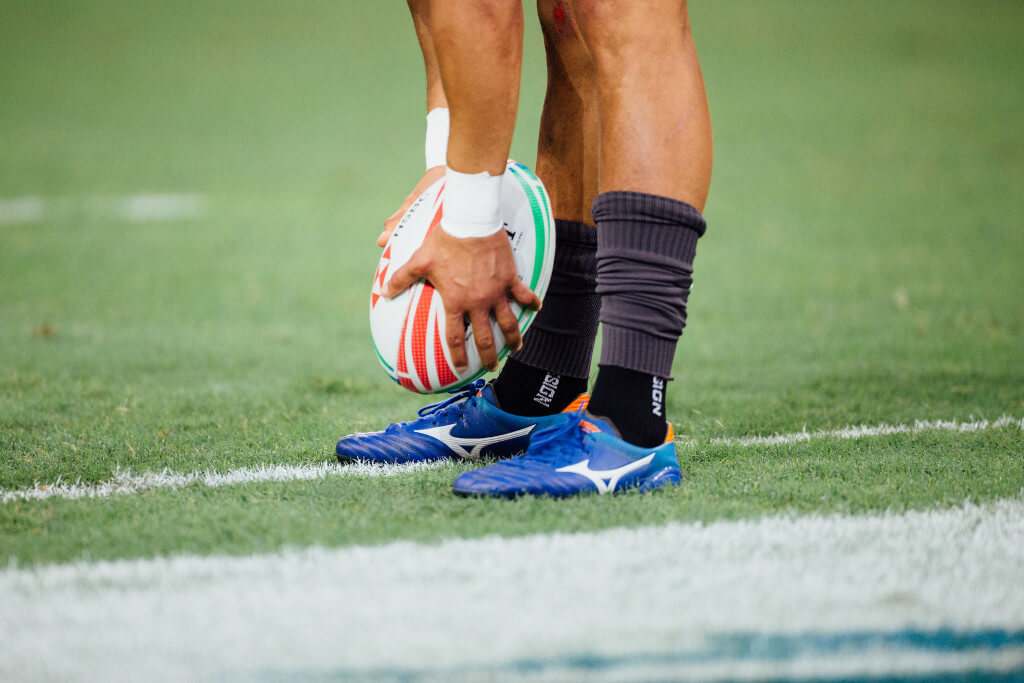Three-time defending champions South Africa (now ranked #2 in the world) and underdog Namibia (currently ranked #21) are two of the 20 countries competing across four pools at the 2023 men’s Rugby World Cup. How good of a chance do they have, and what is the current status of rugby union in Africa? We had some pressing questions for rugby coach Wilbur Kraak, so we asked him.
How Strong is South Africa Right Now?
Several factors put South Africa in a position to succeed. South Africa retained several of the key members of the coaching and support staff that contributed to the country’s 2019 World Cup victory. They’ve brought in new people like Deon Davids to provide new energy and perspective. They have many talented individuals from which to choose, allowing them to field competitive teams regardless of personnel changes. Canan Moodie, Grant Williams, and Kurt-Lee Arendse are just a few of the young stars and seasoned veterans on this team. It’s helpful to have players that can fill in a variety of positions. When they’re rolling, they’re unstoppable, particularly in the areas of collisions and kicking. It helps to have a leader on the pitch like team captain Siya Kolisi.
We must, however, keep a few things in mind. The South African team’s veterans require extra recovery time between games. They’re in a tough group with world number one Ireland and number five Scotland. In matches against lower-ranked opponents, such as Romania and Tonga, they should rotate the team. Goalkicking ability is a must for all-around player Manie Libbok. The squad also needs to maintain its discipline on the pitch and adjust to the officials’ calls. If these considerations are taken into account, South Africa will have a fighting chance.
Your Opinion on Namibia
Namibia has a distinct agenda from neighbouring South Africa. Their main objective, it seems to me, is to beat Uruguay in the World Cup finals for the first time in their history. As the tournament’s hosts, France and New Zealand (ranked third and fourth in the world, respectively) make up a formidable pool, Namibia faces an unusual challenge.
A problem that many lower-tier countries have, including Namibia, is a lack of opportunities to compete in truly competitive rugby. However, they just returned from a tour of South America, so they should be adequately prepared. Namibia needs to play more challenging international matches, strengthen its club system, and maintain parity in player selection if it wants to develop as a rugby power.
Having Allister Coetzee (a member of South Africa’s 2007 World Cup-winning side) and Matthew Proudfoot (a contributor to South Africa’s 2019 victory) as coaches is a boon to this campaign. Having someone with their level of experience is invaluable.
Where Do Things Stand in Africa Right Now?
The difficult but potential future of rugby in Africa. The continent of Africa has been called rugby’s “sleeping giant” due to its enormous untapped potential. However, several obstacles must be overcome before this potential may be utilised effectively.
First and foremost, Africa’s rugby scene necessitates significant financial backing. This entails setting aside funds over the long term to support initiatives like facility upgrades, player development structures, and educator training for coaches. Financial constraints prevent many African countries from receiving adequate investment, preventing them from realising their full potential.
Kenya and other African nations have shown their mettle in the shorter version of the game called rugby sevens, which features seven players per side. However, they still have space to improve in the longer, more traditional version of the game known as rugby union, which features fifteen players per side. In addition, it is crucial for the entire continent to increase participation in and prominence of women’s rugby. If African countries put in the time and money, they can dominate both types of rugby and help the sport flourish around the world.
Another big problem is that fewer clubs than international powerhouses often have enough players to compete in large international events. Only a handful of African teams, including Zimbabwe (ranked 31st), Kenya (ranked 33rd), Uganda (ranked 42nd), and Senegal (ranked 56th), have a realistic shot at making it to the 2023 World Cup finals. This is especially annoying considering the sport’s popularity across the continent.
The desire to grow and better, though, is positive. Several African countries, including Kenya, Zambia, Namibia, and Uganda, are working hard to improve their rugby training and play. They are eager to form alliances and share resources with more developed rugby nations. More African teams may make waves on the world stage with the correct investments and support.
In What Ways Will This Year’s Event Be Different?
The bunker concept, which provides a separate area next to the field for television match officials, raises some interesting questions. Heated disputes may be sparked by the deployment of technology, which is expected to have a major impact on the results of matches.
Given the inevitable occurrence of injuries throughout the campaign, squad depth becomes crucial. Teams that can successfully rotate their players and have a deep bench have an edge.
Inspirational captains and seasoned players making key on-field decisions will have a major impact when they lead their teams effectively. A team’s mental toughness and unyielding focus shine through in their ability to quickly recover from defeats and setbacks.
Then, a change in the way points are scored is anticipated. Improved attacking strategy, innovation, and a willingness to take measured chances could lead to a higher point total during this year’s competition. The result should be more nail-biting contests.
How Can You Become the Best in the World?
Although many criteria contribute to a rugby team’s success, I believe that the following five are the most important. Physical readiness, player management, team unity, coaching strategies, and “X-factor” players who can make things happen out of thin air are all crucial factors.




